The THEORY OF EVERYTHING 3.5***
Starring Eddie Redmayne and Felicity Jones this is the extraordinary
story of one of the world's greatest living minds, the renowned astrophysicist
Stephen Hawking (Redmayne), who falls deeply in love with fellow Cambridge
student Jane Wilde (Jones). Once a healthy, active young man, Hawking receives
an earth-shattering diagnosis of ALS ( Lou Gehrig’s disease) at 21 years
of age. The prognosis is that he will live only for about 2 years. Despite the
devastating news, Jane insists that they marry. With Jane tirelessly fighting
by his side, Stephen embarks on his most ambitious scientific work, studying
the very thing he now has precious little of - time. The movie traces
Hawking's gradual deterioration from walking with difficulty with canes, to
crawling up the stairs, to being wheelchair bound, to losing his voice
and yet surviving and despite the disease. The movie shows very
effectively the terrific toll the disease takes not only on Hawkins but also on
his wife who also has 3 of their children to rear.
Eddie
Redmayne has gotten (and will surely keep getting) a lot of well-deserved
praise for the physical transformation of his performance ( favorably compared
to Daniel Day Lewis), but what really makes his performance so compelling is
how the actor expresses Stephen’s personality (his wit, his aloofness, his
stubbornness) so effectively, regardless of the physical state of his
character. Equally strong, though, is Felicity Jones playing Jane Wilde.
Whereas Stephen’s struggles and complications are easier to comprehend due to
his physical condition, Jones is able to communicate a multitude of conflicted
thoughts and feelings with even the simplest of gestures or expressions. For
sure, it’s these stars along with an excellent supporting cast that truly
elevates this film into something quite special.
The story
is ultimately an insightful love story/relationship that just happens to be
about Stephen Hawking. By focusing on their relationship,
the movie only provides glimpses of Hawking’s genius and astounding scientific
achievements, although it doesn’t dismiss them altogether. This was a
disappointment to me in that I believe the film could have been even better if
it had shown more of his brilliant mind and scientific achievements. But,
nonetheless, it is an awe inspiring movie which is a beautifully filmed with
one striking shot after another, often illustrating the way Hawking looks at
the world such as playing off Hawking’s fascination with black holes… circles
are a recurring motif — the swirl of cream in a coffee cup, the spinning of a
bicycle wheel, an overhead shot of Hawking in his motorized wheelchair doing
360’s. It also includes little grace notes and unexpected details that don’t
conform to an established formula. There is a fascinating scene late in
the film when a nearly immobile wheelchair-bound Hawking fantasizes about
getting out of his wheelchair. Does he fantasize about giving a powerful speech
in his own voice, or sweeping his love into his arms? No, he simply fantasizes
about picking up a pen that someone has dropped on the floor. So simple yet so
powerful.
Clark

No comments:
Post a Comment